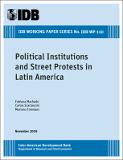| dc.contributor.author |
Fabiana Machado, Carlos Scartascini, and Mariano Tommasi |
| dc.coverage.spatial |
United States |
| dc.date.accessioned |
2016-01-07T15:28:22Z |
| dc.date.available |
2016-01-07T15:28:22Z |
| dc.identifier.uri |
http://desa1.cejamericas.org:8080/handle/2015/3044 |
| dc.description.abstract |
This paper argues that where institutions are strong, actors are more likely to participate in the political process through institutionalized arenas, while where they are weak, protests and other unconventional means of participation become more appealing. This relationship is explored empirically by combining country-level measures of institutional strength with individual-level information on protest participation in 17 Latin American countries. Evidence is found that weaker political institutions are associated with a higher propensity to use alternative means for expressing preferences, that is, to protest. Also found are interesting interactions between country-level institutional strength and some individual-level determinants of participation in protests. |
| dc.language.iso |
English |
| dc.title |
Political Institutions and Street Protests in Latin America |
| dc.ceja.source |
Fuente: Inter-American Development Bank |

